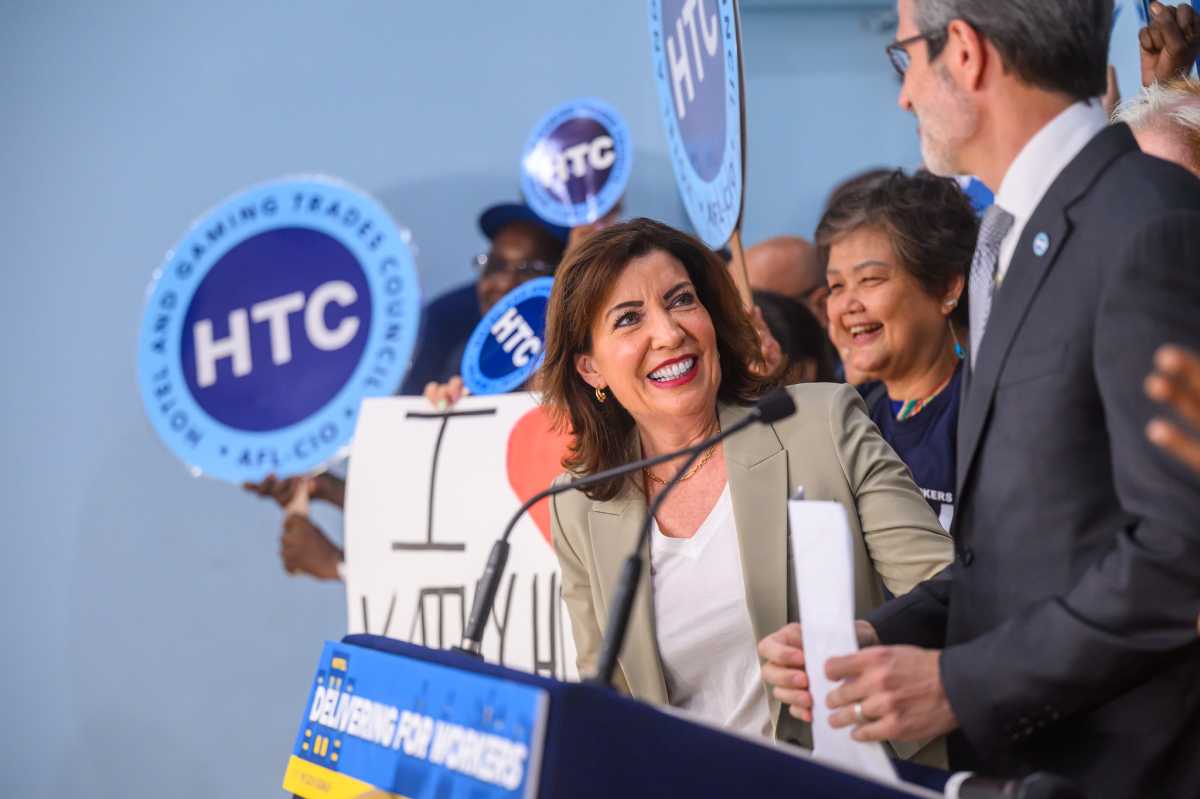Caribbean legislators in New York and other officials are celebrating the establishment of the Haitian Studies Institute (HSI) at Brooklyn College, one of the top colleges in the City University of New York.
After years in the making, many members of the Caribbean community in New York — including from the areas of academia, politics, not-for-profit, and civic groups — have joined New York State Assemblymember Rodnesye Bichotte and New York City Councilmember Jumaane D. Williams, among others, in welcoming the establishment of the first HSI at the Flatbush, Brooklyn campus.
“For a long time, it as was an idea without a home; an idea that didn’t have enough political support; an idea that we thought would remain an idea,” said Bichotte, the daughter of Haitian immigrants and first Haitian American from New York City to be elected to the New York State Assembly, at a press conference last Wednesday at Brooklyn College announcing the establishment of HSI.
“As soon as I was sworn into office, I began work with resurrecting this idea of the Haitian Studies Institute,” added Bichotte, who championed the cause and who represents the 42nd Assembly District that encompasses Brooklyn College.
Williams, the son of Grenadian immigrants, who represents the 45th Council District in Brooklyn and an alumnus of Brooklyn College, hailed Bichotte’s efforts.
“It is good to have an idea, but what you also need is a champion,” said Williams, deputy chair of New York City Council. “Assemblymember Rodneyse Bichotte has been that champion from the moment she was sworn into office.”
He said there is “no better place to house the institute other than Brooklyn College, which is so close our borough’s very own ‘Little Haiti.’
“I look forward to the opening of the institute and their work [in] researching and documenting Haitian culture,” he said.
Brooklyn College President, Michelle J. Anderson, noted that Brooklyn is home to 62,500 foreign-born Haitians — “the largest number of foreign-born Haitians in New York City, and the largest concentration of Haitian-owned businesses and community-based organizations in New York state.”
She said that the appointment of Haitian Dr. Jean Eddy Saint Paul, as director of HSI, bodes well for the institute, stating that his experience and knowledge will “help him make the Haitian Studies Institute at Brooklyn College a global intellectual center.”
Saint Paul ha authored the book “The Militias in Haiti: Sociology of Chimè and Tontons Macoutes,” as well as numerous articles about the often-tumultuous politics and social conditions in the French-speaking Caribbean country.
He holds a Ph.D. in sociology from El Colegio de Mexico, and has also been a visiting scholar at the Carter G. Woodson Institute for African-American and African Studies at the University of Virginia.
Bichotte said Saint Paul “brings a wealth of experience, both domestic and international, as well as a keen understanding of [Haiti’s] social development, structure and its problems.”
She lauded the long list of CUNY officials “for making this milestone possible” while lamenting that the history of Haiti has been “largely suppressed.”
The Haitian-born commissioner of the New York City’s Department of Finance, Jacques Jiha, reminded attendees that “it took 228 years for the United States to acknowledge the contributions of Haiti when it erected a monument at the Battlefield Park Heritage Center in Savannah, Georgia to honor the Haitian soldiers who fought against the British during the Revolutionary War.”
Bichotte said this monument is significant “because it shows that free Africans from Haiti were part of the effort to liberate America from the British.
“For that, Americans owe Haiti, and those soldiers, a debt of gratitude,” she said, adding that Haitian’s “actions would also precipitate the freedom of enslaved Africans in this country.”
In addition, Bichotte said the successful slave revolt in Haiti had a “tremendous impact on the formation of the United States.
“Because Napolean could not gain a strong hold in Saint-Dominigue (Haiti), he decided to give up on Louisiana as a territory as well, and found a willing buyer in the United States, which resulted in the Louisiana Purchase,” the Assemblywoman said. “We can imagine how different our country [United States] would be without Louisiana being part of its borders.”
In speaking French creole, Williams said, “Koun ya tout moun kapab konen de culture Ayisyen — Now everyone can learn about Haitian culture.”

























